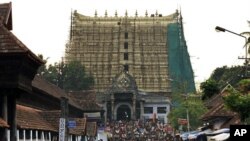Indian police are scrambling to upgrade security at a temple in the country's Southwestern state of Kerala, where buried treasure has been discovered. Supreme Court appointed observers are being dispatched to inventory the find, which includes precious artifacts from centuries of Indian history. A discussion is brewing about how the wealth should be preserved and utilized.
Reports of the treasure trove read like a Hollywood, or Bollywood screenplay - sacks of gold coins, diamonds, and precious statues documenting centuries of trade and worship in southern India.
Value estimates of the find have ballooned from a conservative $ 500 million immediately after its discovery to many billions of dollars in a matter of days. Much of the margin of difference on the estimates relates to the priceless value of some of the items, like one jewel-encrusted gold idol of the Hindu deity, Vishnu.
The treasure was found in underground vaults in the Sree Padmanabhaswamy temple, which was the royal worshipping place for the former rulers of Travancore, in southern Kerala state.
What many can agree upon is that the Sree Padmanabhaswamy temple is on track to be India's richest place of worship. The piles of treasure were found last week buried in sand after temple officials discovered secret underground passageways below the property.
M. Abraham, Police Commissioner of the city of Thiruvananthapuram, where the temple is located, rushed to set up a security perimeter around the treasure.
He says we are posting special armed police around the temple, and will maintain heightened security.
Closed-circuit cameras and other high-tech tools are expected to become permanent fixtures at the temple site.
Wealthy temples are not uncommon in India, where patrons and devotees have made offerings for centuries. The sudden discovery of this temple's massive wealth has sparked discussion of how it might be otherwise used in India, where hundreds of millions of people live on less than a dollar a day.
Oommen Chandy, Chief Minister of Kerala, says the wealth will stay right where it is.
He says the treasure belongs to Sree Padmanabhaswamy Temple and the state government will protect and will provide security to the temple.
The temple is managed by a trust with links to Kerala's historical royal family. Biraj Patnaik, a commissioner to the Supreme Court of India, describes the treasure as purely "notional wealth."
"There's no question of that money being used. It's just going to lie there. At best, it could be exhibited in museums or things like that," said Patnaik.
Patnaik says even if the temple wanted to convert some of the treasure into cash, doing so would be very impractical.
"This would get covered under the antiquities act, so you cannot export them. In any case, it's very cumbersome for a trust to sell any assets that it owns, unless it dissolves itself. And that is not a possibility in this case," Patnaik said.
A Supreme Court appointed team of investigators has been dispatched to the temple to take a formal inventory of the treasure stash.
Indian Authorities Rush To Secure Temple Treasure




